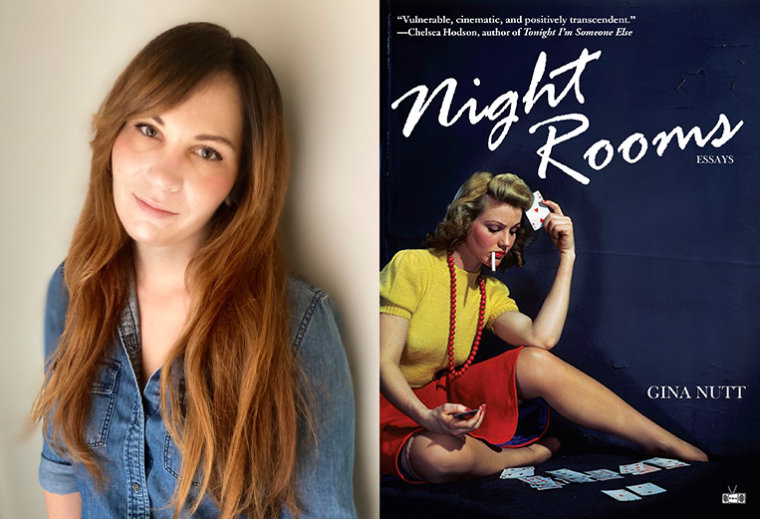This week’s installment of Ten Questions features Gina Nutt, whose debut essay collection, Night Rooms, is out today from Two Dollar Radio. In Night Rooms, Nutt weaves images from horror films and other media with her own personal memories. She writes about potent illusions—how difficult it is to enter the ocean without thinking of Jaws—and others that are more fragile: As a child beauty pageant contestant, she recalls chipping one of her gold trophies, revealing its brown plastic interior. Accumulating vignettes, she circles in on the most intimate and challenging subjects, reckoning with grief and survival. “Gina Nutt writes prose so astonishing I want to read it in an MRI machine just to confirm that every part of my brain indeed lit up,” writes Jeannie Vanasco. “Night Rooms is a brilliant, beautiful, boundlessly inventive book.” Gina Nutt is also the author of the poetry collection Wilderness Champion (Gold Wake Press, 2014). Her writing has appeared in Cosmonauts Avenue, Joyland, Ninth Letter, Poetry Northwest, and Salt Hill, among other publications. She received her MFA from Syracuse University.

Gina Nutt, author of Night Rooms.
1. How long did it take you to write Night Rooms?
Four years. An essay that included the book’s earliest seeds was published in 2017. I kept writing from there, expanding and cutting away, then repeating the process.
2. What was the most challenging thing about writing the book?
Staying true to the lyrical momentum and reining in the disorienting tendencies; finding a balance between the dreamy and concrete.
3. Where, when, and how often do you write?
I write in my office at the back of my house every morning.
4. What are you reading right now?
I’m simmering in a few short story collections: Julián Herbert’s Bring Me the Head of Quentin Tarantino, which is translated by Christina MacSweeney, Souvankham Thammavongsa’s How to Pronounce Knife, and Rebecca Fishow’s The Trouble With Language.
5. Which author, in your opinion, deserves wider recognition?
Jose Perez Beduya, whose debut poetry collection, Throng, is a gorgeous study in image, precision, and atmosphere.
6. Would you recommend writers pursue an MFA?
An MFA—mentors, writing peers, workshops, time to write and read—can be transformative. It was for me. And funding can support an experience plenty of us can’t otherwise afford. I think, too, that online workshops, mentorships, writing groups, and other nonacademic opportunities can channel the most helpful aspects of MFA programs, and are sometimes more accessible or practical. My recommendation is to center the writing at the heart of any creative endeavor, sincerely weigh personal logistics, and decide from there.
7. Outside of writing, what other forms of work were essential to the creation of Night Rooms?
I spent some time in a friend’s jewelry studio during a stretch of revisions. Learning with her and working in a tactile creative form refreshed my approach to making changes in my writing. I also took breaks from this book and worked on other writing. Time away from the book was helpful. So was writing poetry and fiction, finding new approaches or ideas that I could carry back to the essays.
8. Who is your most trusted reader of your work and why?
My husband, David Nutt, who is also a writer. He’s amazing at suggesting when something I considered minor may be the pulse of a piece, or worth another look.
9. What is one thing you might change about the writing community or publishing industry?
Encourage the long game by supporting sustainable creative lives for authors and continuing to reimagine the ways we write, publish, and ascribe value to writing.
10. What’s the best piece of writing advice you’ve ever heard?
Arthur Flowers, in the first fiction workshop I found myself in as an undergraduate: “You’ve got to learn how to sing your own song and respect others for singing theirs.”







